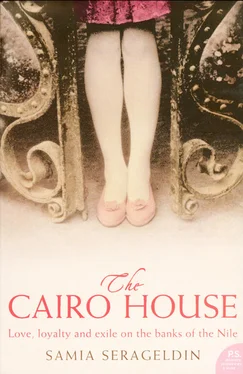He swung his arm back and lunged at her, swiping blindly at her face as he lost his balance. She screamed and turned, running for the door.
‘Get out!’ He was frothing at the mouth. ‘Don’t ever come back! You’re no longer my daughter!’
She ran out, not stopping to pick up her handbag.
A few hours later, Zohra let Shamel into her husband’s bedroom. ‘No one has been able to go near him,’ she whispered, her eyes red. Shamel patted her hand and closed the door behind him. In the semi-darkness of the room he made out the figure of his brother-in-law lying on the bed, still wearing his muddy shoes.
‘Who is it?’ Makhlouf Pasha growled, lifting the ice pack off his forehead. ‘Oh, it’s you! I should throw you out of my house! It’s all your fault. I trust you with my daughter and you play the Pander between her and that—’
‘I wanted to tell you that Gina –’
‘Don’t ever pronounce that name in my house! I have no daughter by that name.’
‘She only disobeyed you that one time, I swear. And nothing happened. Even after you threw her out and she ran to Ali, he brought her straight to me, he didn’t even let her through his door. The last thing he wants to do is compromise her. Don’t you see that you’re wrong about him? He would marry her this minute, in the dress she’s wearing, but he must have your blessing. He won’t make her choose between him and her family. And he has too much pride to marry her without her father’s permission. The Tobias have their pride too.’
‘By Allah she’ll have nothing from me! Not one feddan after I die and not one piastre while I’m living. She’ll be sorry. No wedding trousseau, no shopping trip to Europe, no furniture, no decorator, no antiques, nothing. Let’s see how long this true love will last.’
‘It won’t make a difference to Gina. If it were any of her sisters, I’d agree with you. But she’s different, things like that don’t matter to her. And I can speak for Ali. All he wants is Gina – but not without your blessing.’
‘Then let him have her! In nothing but the dress she is wearing!’
‘And your blessing –’
‘My blessing, my curses! Now get out before you kill me!’
It was a happy ending, for a while. Gina and Ali set up house in an apartment with simple modern furniture. My parents were newlyweds themselves, and the two couples were inseparable. When I was born, my father named me Gihan.
That year the coup d’état of 1952 changed everything, although no one at the time realized the magnitude of what was happening.
The day came when the bulk of the large estates was confiscated from the landowning families. Mostly the fellahin accepted this momentous change with their usual mixture of resignation and indifference, but there were isolated incidents of violence. When the rumor spread that government agents were on the way to confiscate Makhlouf Pasha’s country house, a mob of peasants besieged the place. Their intention seemed to have been to loot the house before the agents arrived. Makhlouf came out on the terrace and roared at them, and they took a few steps back. But he was suddenly struck by a massive stroke and collapsed, speechless. The fellahin surged forward; some of them were carrying torches and they set fire to the house. Makhlouf and his family were smuggled out in a car, the two youngest girls lying on the floor. Makhlouf never recovered from the effects of the stroke; he remained a paralyzed husk of a man.
Ten years later the selective sequestration decrees targeted certain families, notably the Seif-el-Islams and the Makhloufs. Gina’s sisters, married to their cousins, sold off their jewelry and their furniture, piece by piece, to live from day to day.
Meanwhile Ali’s reputation as a brilliant cardiologist had risen steadily. The waiting rooms at his clinic overflowed and he was increasingly called in for consultations by the most prominent members of the new regime. His success cost him long hours away from home, but he encouraged Gina to go out without him. She was often seen at parties and restaurants, always with a group of close friends from the new elite of doctors and their wives.
One day the rumors started about Gina and the scion of a Lebanese banking family. She did not lie to Ali.
‘You’re my only friend,’ she pleaded, ‘help me.’
He acted like a perfect gentleman: he divorced her on the spot, pronouncing the ritual words ‘I release you,’ three times in quick succession. He told her she could take anything she wanted, as long as she left quickly. She took nothing but photographs of the two children she was leaving behind, Leila and Tamer. There was no question of taking the children with her; they were both of an age when custody would have gone automatically to the father, even if the mother were not the one to ask for divorce, even if she were not leaving the country, even if she were not remarrying.
I remember the day Gina left for Lebanon; she came to our house to say goodbye. I was fourteen at the time. I watched from the balcony as she arrived in the Lebanese playboy’s sports car. He stayed in the car, but I got a glimpse of dark sunglasses and a gold bracelet on his wrist glinting as he tapped his fingers on the side-view mirror.
Gina ran up the stairs and into the living-room where my father was waiting. She came towards him, arms outstretched. ‘You’re the one person I couldn’t leave without saying goodbye!’
‘Goodbye, Gihan,’ he said very quietly.
She stopped dead in her tracks. Then she turned on her heel and ran out of the room and down to her lover waiting in the car.
At the time I misjudged my father’s harshness. I even attributed it to the fact that the man was a Maronite, and that Gina would marry out of her religion. But I realize now that it had nothing to do with it. My father was a romantic. He had believed in their love, his Gina and his best friend. He could not forgive her for disillusioning him.
Many years later, Tante Zohra was to tell me that for Gina it always had to be the grand passion. She was one of those women who need to feel in love, the way an addict craves an elusive state of euphoria. She could not bear to see her romance with Ali succumb to routine and neglect; she could not bear to be taken for granted. She looked for the immediacy, the missing thrill, the passion, in the eyes and the arms of another.
Today I can try to understand the fugue for which Gina was condemned without appeal by everyone she knew. But what I remember thinking at the time was that I could never bear to disillusion my father that way. Did Gina give a thought that day to the adolescent girl watching from the corner? Do we ever realize, when we take a plunge, that the ripples we create can spread as far as the distant shore? But there was no way anyone could have imagined then that Gina’s story would lie like a palimpsest under mine, long after it had faded from memory.
As for Gina, Papa never saw her again. A few years later the civil war broke out in Lebanon; it must have been particularly hard for her, a Muslim married to a Maronite.
But he did see Ali again. A year after Gina left him Ali remarried, a younger woman with ties to the new regime. He became President Nasser’s personal physician. So it was hard to believe when Dr Ali Tobia came to visit my father one night. It had been years, even before his divorce from Gina, that he had not come to our house. Few people who had anything to lose risked association with the families that Nasser had designated as ‘enemies of the people’. It was no secret that the intelligence agent at the door took note of every visitor, that the telephone was tapped and the servants were spies. Even in the privacy of our own bedrooms, between parent and child, we still whispered. That Nasser’s personal physician would risk calling on my father was unthinkable.
Читать дальше











